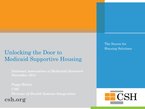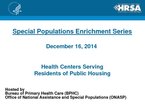0
Publication
Community:
The role of public and nonprofit hospitals and hospital systems in supportive housing is not an obvious one at first glance. Traditionally, the role of nonprofit and public hospitals has been to provide primary healthcare and additional health services to the public, often to select “catchment” areas or neighborhoods. The extent of these institutions’ role in housing was limited to either providing a) short-term inpatient beds for medical or treatment services, or b) residences for nurses or other hospital staff. Why then are more and more nonprofit and public hospitals becoming involved in not only creating, but also providing and managing supportive housing?
Authored by: Richard Cho for CSH
Topics: Health, Homelessness, Housing, Partnerships, Research, Supportive housing
 Shared by Housing Is
Shared by Housing Is
Housing Is posted a
on Apr 17, 2019
The role of public and nonprofit hospitals and hospital systems in supportive housing is not an obvious one at first glance.
0
Publication
Community:
The Keeping Families Together model turned the usual paradigm for prioritizing affordable housing on its head. Rather than targeting the most “stable” families, Keeping Families Together sought out families with the most complicated cases—those at greatest risk. Thanks to this approach, families once on the brink of crisis now have a permanent place to call home, as well as the services and support they need to stay together.
Authored by: CSH
Topics: Child welfare, Family engagement, Homelessness, Housing, Low-income, Partnerships, Research, Supportive housing
 Shared by Housing Is
Shared by Housing Is
Housing Is posted a
on Apr 4, 2019
The Keeping Families Together model turned the usual paradigm for prioritizing affordable housing on its head. Rather than targeting the most “stable” families, Keeping Families Together sought out families with the most complicated cases—those at greatest risk.
0
Publication
Community:
Apr 1, 2019
The Housing and Medicaid Services Pilot Program in Indianapolis, also known as the Blue Triangle Housing Program, is a collaboration that includes Anthem, the City of Indianapolis, a non-profit housing organization, and a community mental health center (CMHC).
Authored by: CSH
Topics: Health, Housing, Medicaid / Medicare, Midwest, Partnerships, Supportive housing
 Shared by Housing Is
Shared by Housing Is
Housing Is posted a
on Apr 4, 2019
The Housing and Medicaid Services Pilot Program in Indianapolis, also known as the Blue Triangle Housing Program, is a collaboration that includes Anthem, the City of Indianapolis, a non-profit housing organization, and a community mental health center (CMHC).
0
Publication
Community:
Mar 1, 2019
CSH selected the Center for Data Science and Public Policy (DSaPP) at the University of Chicago to develop a web-based data integration tool, which was completed in 2018. The tool connects county jail administrative data from the justice system to homeless system data, through communities’ Homeless Management Information Systems (HMIS).
Authored by: CSH
Topics: Criminal justice, Data sharing, Homelessness, Housing, Midwest, Partnerships, Supportive housing
 Shared by Housing Is
Shared by Housing Is
Housing Is posted a
on Apr 4, 2019
CSH selected the Center for Data Science and Public Policy (DSaPP) at the University of Chicago to develop a web-based data integration tool, which was completed in 2018.
0
News Article
Community:
Jan 24, 2019
A new collaboration of San Francisco Bay Area foundations and businesses is raising $540 million to tackle the region’s affordable housing crisis.
Authored by: Affordable Housing Finance
Topics: Community development, Health, Housing, Low-income, Partnerships, Supportive housing, West Coast
 Shared by Housing Is
Shared by Housing Is
Housing Is posted a
on Jan 28, 2019
Affordable Housing Finance
A new collaboration of San Francisco Bay Area foundations and businesses is raising $540 million to tackle the region’s affordable housing crisis.
0
Publication
Community:
Nov 20, 2018
People with mental health disabilities are vastly overrepresented in the population of people who experience homelessness. Of the more than 550,000 people in America who experienced homelessness on a given night in 2017, 1 in 5 had a mental illness. The proportion of people experiencing chronic homelessness with mental health disabilities was even higher—nearly 1 in 3. Despite this fact, the reality is that most people with mental illness fortunately do not experience homelessness: While about 20 percent of all adults in the United States have a mental illness, less than two-tenths of 1 percent of people in the country experienced homelessness on a given night in 2017.
Authored by: Heidi Schultheis for Center for American Progress
Topics: Depression, Disabilities, Homelessness, Housing, Legislation & Policy, Low-income, Mental health, Partnerships, Preventative care, Stability, Substance abuse, Supportive housing
 Shared by Mica O'Brien
Shared by Mica O'Brien
Mica O'Brien posted a
on Nov 20, 2018
Heidi Schultheis for Center for American Progress
People with mental health disabilities are vastly overrepresented in the population of people who experience homelessness. Of the more than 550,000 people in America who experienced homelessness on a given night in 2017, 1 in 5 had a mental illness.
0
Publication
Community:
Aug 9, 2018
Introduction to supportive housing and notes from the field
Authored by:
Topics: Health, Housing, Low-income, Medicaid / Medicare, Mental health, Partnerships, Supportive housing
 Shared by Housing Is
Shared by Housing Is
Housing Is posted a
on Aug 9, 2018
Introduction to supportive housing and notes from the field
0
Publication
Community:
Jul 27, 2018
Authored by:
Topics: Asthma, East Coast, Health, Healthy homes, Housing, Low-income, Partnerships, Supportive housing
 Shared by Housing Is
Shared by Housing Is
Housing Is posted a
on Jul 27, 2018
0
Publication
Community:
Jul 27, 2018
On January 1, 2014, in states that have chosen to expand Medicaid eligibility under the Affordable Care Act, nearly all chronically homeless people who lacked health insurance became eligible for Medicaid. This Primer offers state Medicaid officials and other interested parties strategies for using Medicaid to meet the needs of this very vulnerable population--some strategies that have succeeded in the past and some that are emerging under provisions of the Affordable Care Act.
Authored by:
Topics: Affordable Care Act, Criminal justice, Disabilities, Dual-eligibles, Funding, Health, Homelessness, Housing, Low-income, Medicaid / Medicare, Mental health, Partnerships, Stability, Substance abuse, Supportive housing
 Shared by Housing Is
Shared by Housing Is
Housing Is posted a
on Jul 27, 2018
On January 1, 2014, in states that have chosen to expand Medicaid eligibility under the Affordable Care Act, nearly all chronically homeless people who lacked health insurance became eligible for Medicaid.
0
Publication
Community:
Jul 13, 2018
Recognizing the layers to developing a health and housing partnership, this Literature Review and Resource Bank is intended to provide background and data resources that can be used in grant applications or in conversations with potential funders in the effort to foster new health and supportive housing partnerships.
Authored by:
Topics: Cost effectiveness, Criminal justice, Data sharing, Dual-eligibles, Funding, Health, Homelessness, Housing, Low-income, Medicaid / Medicare, Mental health, Partnerships, Post-secondary, Preventative care, Research, Seniors, Substance abuse, Supportive housing, Youth
 Shared by Housing Is
Shared by Housing Is
Housing Is posted a
on Jul 13, 2018
Recognizing the layers to developing a health and housing partnership, this Literature Review and Resource Bank is intended to provide background and data resources that can be used in grant applications or in conversations with potential funders in the effort to foster new health and supportive hou
0
Publication
Community:
Jul 12, 2018
This report examines four specific aspects of the challenge before us:
• The need for a much greater supply of homes affordable to our nation’s lowest-income seniors.
• The importance of transforming homes and communities so that seniors can age with options, a desire shared by the overwhelming majority of older adults.
• The imperative to better integrate health care and supportive services with housing, recognizing that this integration has the potential to improve health outcomes for seniors and reduce the costs borne by the health care system.
• The need to deploy technologies on a far wider scale to help all Americans age successfully.
Authored by:
Topics: Cost effectiveness, Funding, Health, Home visiting, Homelessness, Housing, Legislation & Policy, Low-income, Medicaid / Medicare, Partnerships, Place-based, Preventative care, Seniors, Supportive housing
 Shared by Housing Is
Shared by Housing Is
Housing Is posted a
on Jul 12, 2018
This report examines four specific aspects of the challenge before us:
• The need for a much greater supply of homes affordable to our nation’s lowest-income seniors.
• The importance of transforming homes and communities so that seniors can age with options, a desire shared by the overwhelming ma
0
Publication
Community:
Jul 10, 2018
Working Together to Meet Unmet Housing and Healthcare Needs
Authored by:
Topics: Affordable Care Act, Data sharing, Health, Homelessness, Housing, Low-income, Medicaid / Medicare, Mental health, Partnerships, Stability, Substance abuse, Supportive housing
 Shared by Housing Is
Shared by Housing Is
Housing Is posted a
on Jul 10, 2018
Working Together to Meet Unmet Housing and Healthcare Needs
0
News Article
Community:
Aug 1, 2016
Boulder County, Colo., pioneered the movement. What can others learn from their experience?
Authored by: Mattie Quinn for Governing the State and Localities
Topics: Cost effectiveness, Data sharing, Dual-eligibles, Food insecurity, Health, Homelessness, Housing, Legislation & Policy, Low-income, Medicaid / Medicare, Partnerships, Place-based, Supportive housing, West Coast
 Shared by Housing Is
Shared by Housing Is
Housing Is posted a
on Jul 5, 2018
Mattie Quinn for Governing the State and Localities
Boulder County, Colo., pioneered the movement. What can others learn from their experience?
0
Publication
Community:
Jun 8, 2017
A multi-faceted technical assistance resource for Public Housing Agencies and their partners who want to end homelessness. The Tookit is organized into five main sections: (1) Housing Choice Vouchers, (2) Public Housing, (3) Project-Based Vouchers, (4) Unique PHA Programs & Initiatives, (5) Primer on Homelessness ans Supportive Housing.
Authored by: Corporation for Supportive Housing (CSH)
Topics: Homelessness, Housing, Medicaid / Medicare, Partnerships, Substance abuse, Supportive housing
 Shared by Steve Lucas
Shared by Steve Lucas
Steve Lucas posted a
on Jun 8, 2017
Corporation for Supportive Housing (CSH)
A multi-faceted technical assistance resource for Public Housing Agencies and their partners who want to end homelessness.
 Shared by Housing Is
on Apr 17, 2019
Shared by Housing Is
on Apr 17, 2019
 Shared by Housing Is
on Apr 4, 2019
Shared by Housing Is
on Apr 4, 2019
 Shared by Housing Is
on Apr 4, 2019
Shared by Housing Is
on Apr 4, 2019
 Shared by Housing Is
on Apr 4, 2019
Shared by Housing Is
on Apr 4, 2019
 Shared by Housing Is
on Jan 28, 2019
Shared by Housing Is
on Jan 28, 2019


 Shared by Housing Is
on Aug 9, 2018
Shared by Housing Is
on Aug 9, 2018
 Shared by Housing Is
on Jul 27, 2018
Shared by Housing Is
on Jul 27, 2018
 Shared by Housing Is
on Jul 27, 2018
Shared by Housing Is
on Jul 27, 2018
 Shared by Housing Is
on Jul 13, 2018
Shared by Housing Is
on Jul 13, 2018
 Shared by Housing Is
on Jul 12, 2018
Shared by Housing Is
on Jul 12, 2018
 Shared by Housing Is
on Jul 10, 2018
Shared by Housing Is
on Jul 10, 2018
 Shared by Housing Is
on Jul 5, 2018
Shared by Housing Is
on Jul 5, 2018
 Shared by Steve Lucas
on Jun 8, 2017
Shared by Steve Lucas
on Jun 8, 2017









